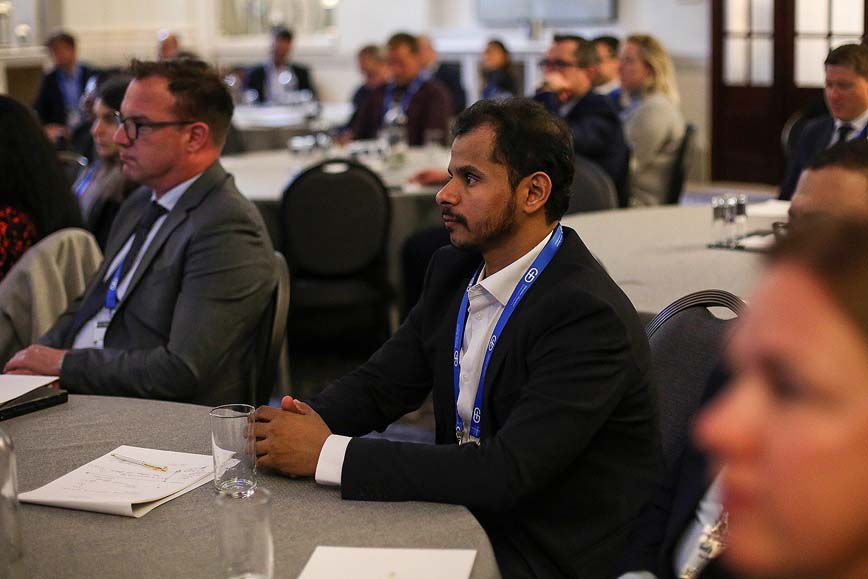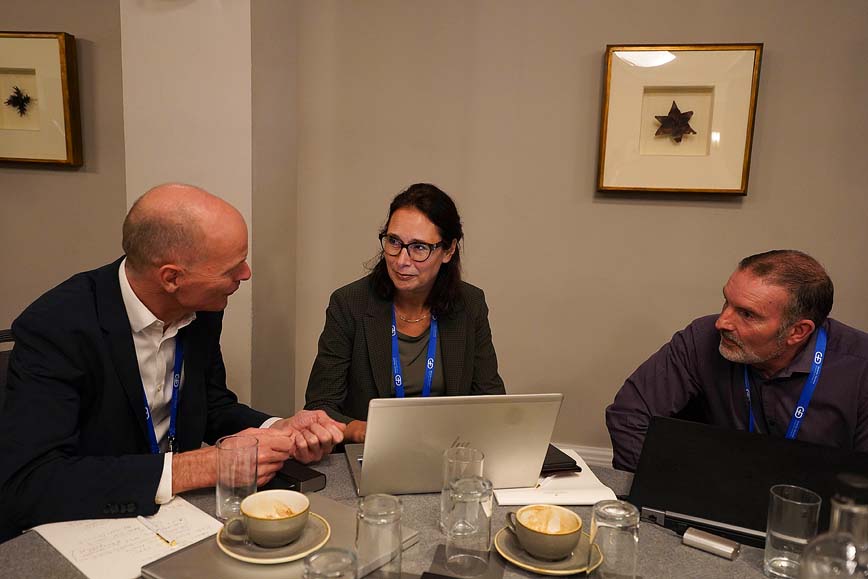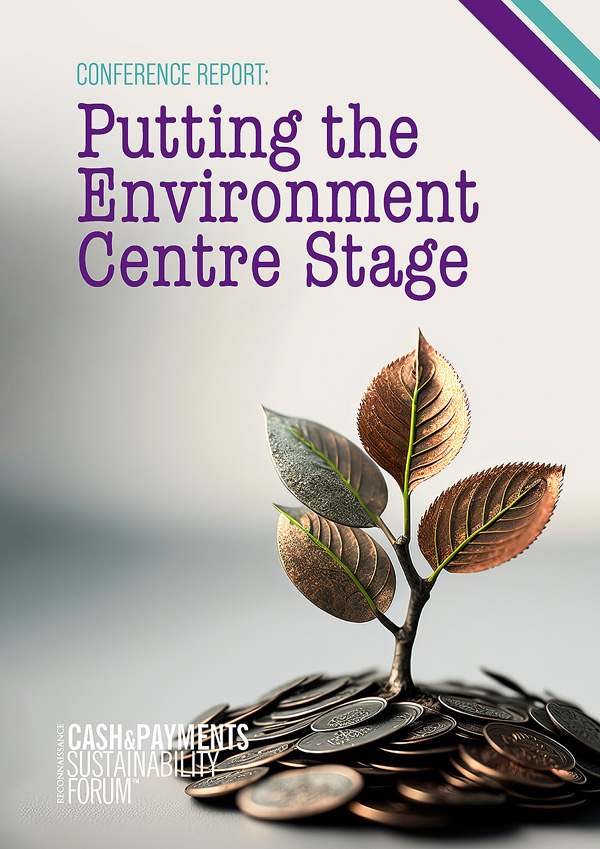2022 Review
Access to the presentations is limited to CPSF 2022 attendees, please use the password which was provided by the [email protected]
Putting Sustainability Centre Stage
The Cash & Payments Sustainability Forum™ was an industry first, an event focused on sustainability, particularly environmental sustainability, in the cash industry. A year after COP 26 was in Scotland and with COP 27 taking place in Egypt, this was a chance to reflect on what to do in our area of responsibility.
The size of the event meant a round table approach was possible and there was the opportunity to ask questions and have good conversations. A third of the speakers came from outside of the industry giving the opportunity for new information and different thinking, not just the sharing of best industry practice, valuable as that is. The agenda was organised in three parts, policy, operations and the cash cycle with the thought that there would be something for all in each area. The programme started with a seminar on the UK’s Cash Industry Environmental Charter group’s work and finished with a session on the cash cycle. Given that cash management companies tend to focus on their own dedicated conferences, it was good to have this perspective in the Forum.
Crisis and the role of measurement
The opening session set the scene with the University of Edinburgh Business School’s Dr Sarah Ivory laying out the environmental challenges we all face and the urgent need to reduce emissions and adapt to the change that is now inevitable. The Royal Mint explained its end-to-end Environment, Social and Governance (ESG) programme reminding us that sustainability is more than just looking after the environment. MyCarbon laid out the theory of Life Cycle Assessments (LCAs) and the Dutch National Bank (DNB) then gave us an update on its 2015 LCA with the unwelcome news that the impact of cash payments is five times greater than that of debit card payments. However, the good news is that the DNB can see a clear route forward to cash reducing its impact significantly enabling it to compete with cards in the future. Dr Franz Seitz also reminded us that sustainability includes the social good of the products and that cash attributes such as resilience, privacy and the inclusiveness of cash need to be factored in when making comparisons.
Procurement
One approach to driving change is to include environmental criteria in tenders. NatWest Bank explained how it is working as a partner with suppliers getting them to use a ratings agency post-appointment as a supplier and then to use the scores to do better. DNB explained how it has used its tenders to increase the use of sustainably sourced cotton to the point in 2019 when 100% was sourced sustainability. In its 2021 procurement DNB gave two elements of sustainability a weighted score in the adjudication of suppliers. This use of sustainability is a work in progress.
Staff engagement
While ESG programmes and reporting are a powerful tool for companies to manage their sustainability progress, bottom up programmes are important. In that context NatWest, Vaultex and G+D all spoke about their work in this area. NatWest is working at a large scale but there were lessons to learn from their approach. Vaultex’s Green Path initiative, that has been running since 2019, and G+D’s 2022 ‘hackathon’, were more immediate and relatable examples to consider.
Energy
Crossing the gap between policy and operations were three speakers talking about energy. Npower, an energy provider, gave a detailed presentation of the challenges of energy reduction and thoughts on how to manage Scope 2 and Scope 3 energy. Dr Matthew Brander from the University of Edinburgh Business School highlighted the risk of greenwashing when organisations claim to be using renewable energy on a market-based method of assessment that does not include additionality. Additionality is the requirement to prove that the renewable energy being bought is coming from a new source rather than an existing source. As part of this session THG Eco, a specialist in carbon offsetting, explained how to buy carbon credits with confidence that they are ethical and meaningful. THG Eco also explained options for how to buy them and that the market price varies in line with additionality. Supply exceeds demand and prices are low and set to remain low.


Manufacturing sustainabilityThere were two sessions dedicated to manufacturing sustainability. The European Central Bank explained how its development of the third series of user banknotes is putting sustainability at the heart of its assessments and decision making. CCL Secure and Oberthur gave detailed descriptions of their environmental work. Both were full of rich examples of what they have done and the results achieved. Verco is a consultancy helping manufacturers make changes. It works closely with CCL Secure but presented about the role of process in getting to net zero emissions. G+D presented its Green Banknote initiative including sustainable cotton, recycled polymer, mineral free oil inks tec. Komori started its work on sustainability at the start of the century. With typical Japanese thoroughness it has worked systematically ever since to do better. The Royal Canadian Mint had more of an ESG message but included case studies on energy usage, the coin life cycle and alloy recovery.
Disposal of unfit banknotes at the end of their lives
The Forum saw the launch of a white paper on how to dispose of unfit cotton banknotes at the end of life, ‘What Goes Around Comes Around’. Given that over 90% of the world’s banknotes are cotton based, the paper sets out to give the science, practical examples and an outline approach to moving up the hierarchy of waste disposal options. This paper was complemented by a new survey of over 80 central banks by Kusters into what banks are doing in this area covering paper, composite substrates and polymer substrates. Hunkeler presented its paper issued at the start of November which focused on organising shredded waste ready for disposal. Although delivered remotely, the Pakistan Security Printing Corporation presented its work on composting unfit banknotes. This detailed piece of work demonstrated that composting is a viable option available to almost all central banks. Given how many central banks now have one or more denominations on a polymer substrate, De La Rue talked about how it helps customers recycle their polymer notes.


Cash cycle
Koenig and Bauer Banknote Solutions (KBBS) presented on the use of data in the cash cycle. It presented the case that in the changing environment we face data can reduce some of the friction that is making cash expensive, inconvenient and with a larger environmental impact. KBBS has introduced two apps recently seeking to bridge the gap between the physical and digital worlds. The consumption of fossil fuels moving cash is one of the big environmental areas for the cash cycle. Loomis explained is carbon reduction initiatives, its work on plastics (reduction, recycling and offsetting) and its Scope 2 green energy work.
FedCash® Services described its environmental work including what it is doing with disposing of shredded banknote waste and its E-manifest service, which replaces paper-based systems with electronic manifests. It has also started a project to look at what to do with its plastic waste. G+D explained its Green Cash Cycle initiative that works with the Green Banknote initiative presented in the manufacturing session. To reduce plastic G+D is focusing on cash design, processing and distribution. Less power, more automation, less packaging, multi-bank cash centres, network forecasting etc.
Final word
This was a rich event full of new thinking, fresh discussions and detailed explanations of what organisations are doing and why. A full report is being written and there will be articles in Currency News™ and Cash & Payment News™ but being there was special. Planning and thinking about how to run a future event is underway. Input from all is welcome!
Attendees
Banco de España (Bank of Spain)
Spain
Bank of Canada
Canada
Central Bank Of Oman
Oman
ClimateTrade
Spain
Crane Currency
USA
Currency Research
United Kingdom
Danmarks Nationalbank
Denmark
De Nederlandsche Bank
Netherlands
Deutsche Bundesbank
Germany
E.On
United Kingdom
European Central Bank
Germany
FRFS FedCash Services
USA
G+D Currency Technology GmbH
Germany
Glory Global Solutions
United Kingdom
Hunkeler Systeme
Switzerland
IBDA
Switzerland
International Currency Association
United Kingdom
Istituto Poligrafico e Zecca dello Stato S.p.A.
Italy
Koenig & Bauer Banknote Solutions
Switzerland
Komori Corporation
United Kingdom
Loomis
Spain
Luminescence Sun Chemical Security
United Kingdom
Magyar Nemzeti Bank
Hungary
MyCarbon
United Kingdom
Narodowy Bank Polski
Poland
Natwest
United Kingdom
Oberthur Fiduciaire
France
Pakistan Security Printing Corporation
Pakistan
Rewired Earth
United Kingdom
Semigator GmbH
Germany
SICPA
Switzerland
The Hut Group
United Kingdom
UK Finance
United Kingdom
University of Edinburgh
Scotland
Vaultex
United Kingdom
Verco
United Kingdom
Weiden Technical University of Applied Sciences
Germany
Programme
Access to the presentations is limited to CPSF 2022 attendees, please use the password which was provided by the [email protected]
Monday 14 November
Seminar 13:30 – 17:00: Cash Industry Environmental Charter Group (CIECG)
This seminar is free for Central Bank Delegates and UK CIECG members – see the Fees section for more information.
The Difference Industry Co-operation Can Make
In September 2020 a UK commercial bank, NatWest, invited 36 organisations to meet online to discuss the collective environmental impact of their cash operations. The discussion was about what could be achieved if they worked together. In January 2021 a Charter was signed committing signatories to get to zero carbon emissions by 2030 for operations, eliminate single-use non-recyclable plastics in note centres by 2030, to reduce single-use non-recyclable plastics in coin centres b 2030 (on a sliding scale between now and then) and to get to 100% renewable electricity for their own operations by 2022.
This seminar explores how the Charter group was set up, how it is organised and operates and what it has achieved. The group is as active today as it was when it started and the work that it does is detailed, measured and transparent. The Bank of England and the Royal Mint are members, as are all the Note Circulation Scheme sorting members, six commercial banks and two cash in transit companies.
The aim of the seminar is to demonstrate what is possible and to inspire others to do the same.
Speakers: Leeann Shanks – NatWest Bank, Nicky Scowen – UK Finance, Sarah Allen – Vaultrex UK, Andrew Cowens – Loomis
Tuesday 15 November
Session 1: Doing ESG Well
10:00
Monitoring the Life Cycle Impact of the Dutch Cash Cycle
Jan-Mark Geusebrock
Dutch National Bank (The Netherlands)
10:20 – Q&A
Session 2: Procurements and Tenders
11:00
Cash and Sustainability: Facts, Challenges, Open Questions
Franz Seitz
Weiden Technical University of Applied Sciences (Germany)
11:40
Including Sustainability in the Procurement of Banknotes
Annemieke de Gooijer
Dutch National Bank (The Netherlands)
Session 3: Co-operation and Staff Engagement
14:10
How to evaluate investments in terms of sustainability and involve employees to drive sustainability projects?
Felix Ehrtmann
G+D Currency Technology GmbH (Germany)
14:50 – Q&A
15:00 – Break – Refreshments
Session 4: Manufacturing Sustainability Part 1
15:30
Eco-designing the third series of euro banknotes. First steps
Antonio Arrieta
European Central Bank
15:50
Less is more – Reducing the product carbon footprint and material usage in banknotes
Felix Ehrtmann
G+D Currency Technology GmbH (Germany)
16:50 – Q&A
Wednesday 16 November
Session 5: Manufacturing Sustainability Part 2
08:30
Data: is it the missing link to creating a more sustainable future for cash?
Mark Stevenson
International Banknote Designers Association
09:10
Innovative measures towards sustainable manufacturing
Benoit Renault
Oberthur Fiduciare (France)
09:50 – Q&A
10:00 – Break – Refreshments
Session 6: How to Dispose of Unfit Banknotes
10:30
Pakistan’s work on composting banknotes
Syed Faizan Haider Shah
Pakistan Security Printing Corporation (Pakistan)
10:50
Unfit banknote recycling study and new recycling solutions
Jeroen Kusters
Royal Dutch Kusters Engineering (Netherlands)
11:10
Sustainability starts with the destruction process of banknotes
Gabriel Moser
Hunkeler (Switzerland)
11:50 – Q&A
12:00 – Lunch
Session 7: Getting to Net Zero Emissions
13:00
Making net zero achievable, financially-viable and sustainable for your organisation
Gareth Metcalf
NPower Business Solutions (UK)
13:20
The challenges of buying renewable energy
Matthew Brander
Edinburgh University Business School (UK)
14:00 – Q&A
14:10 – Break – Refreshments
Session 8: Reducing the Impact of the Cash cycle
14:50
The Federal Reserve’s work on sustainability in the cash cycle
Robert Bujas
FRFS FedCash Services (USA)
15:10
On the Road To Circularity: the steps we take towards a Green Cash Cycle
Gurpal Singh
G+D Currency Technology GmbH (Germany)
Thank you to our Table Top Exhibitor

Putting the Envrionment Centre Stage
The Cash & Payments Sustainability Forum™ in Edinburgh was an industry first. As such it was very much an experiment, a step into the unknown.
Following on from the November 2021 white paper, ‘Cash: A Roadmap to Sustainability’, and a series of conference seminars throughout 2022, the goal was to take a systematic and in-depth look at sustainability for central banks, cash producers and the cash management sector.
Download your free copy!
















































































































